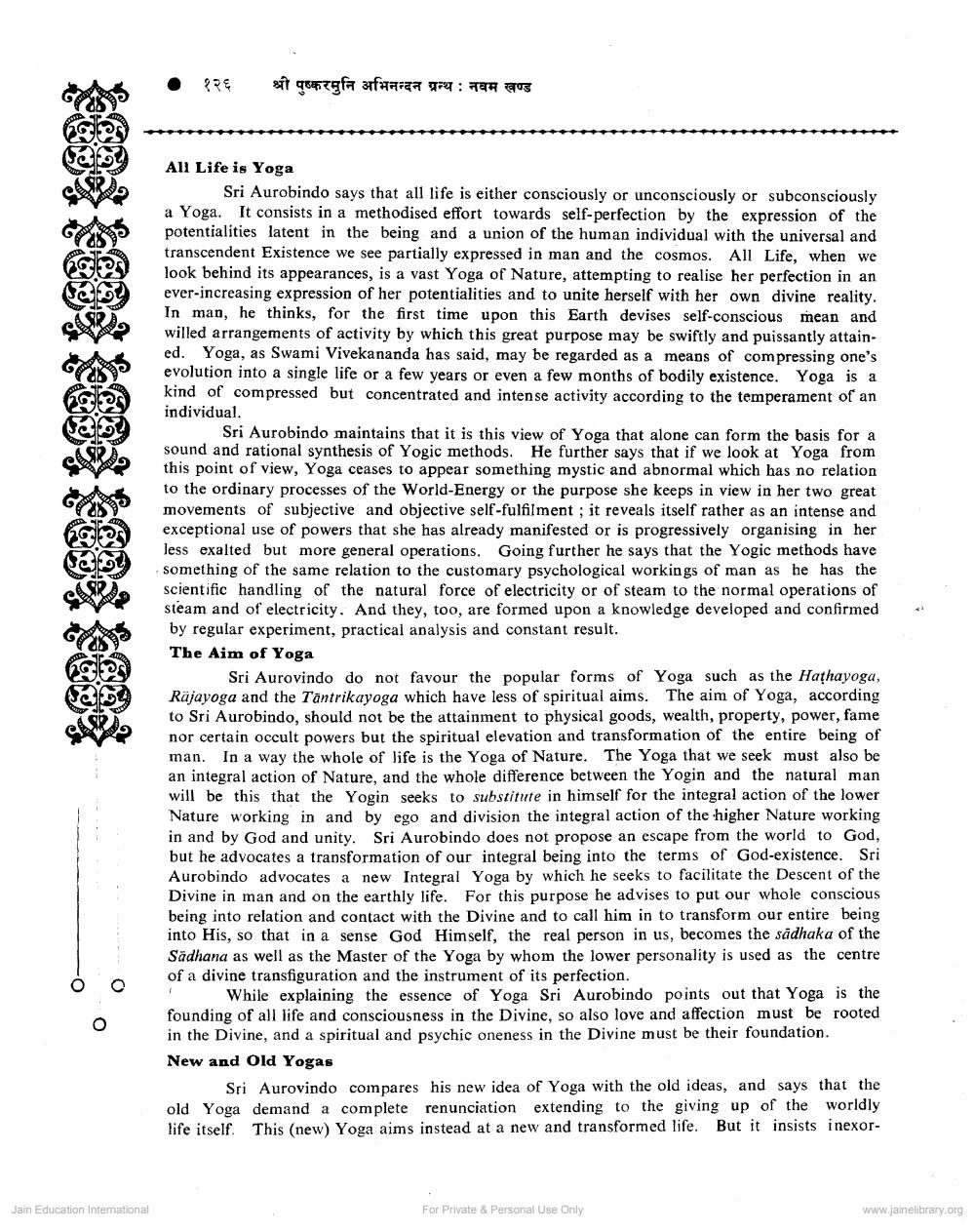Book Title: Integral Yoga Its Nature and Significance Author(s): G N Joshi Publisher: Z_Pushkarmuni_Abhinandan_Granth_012012.pdf View full book textPage 6
________________ १२६ श्री पुष्करमुनि अभिनन्दन ग्रन्थ : नवम खण्ड All Life is Yoga Sri Aurobindo says that all life is either consciously or unconsciously or subconsciously a Yoga. It consists in a methodised effort towards self-perfection by the expression of the potentialities latent in the being and a union of the human individual with the universal and transcendent Existence we see partially expressed in man and the cosmos. All Life, when we look behind its appearances, is a vast Yoga of Nature, attempting to realise her perfection in an ever-increasing expression of her potentialities and to unite herself with her own divine reality. In man, he thinks, for the first time upon this Earth devises self-conscious mean and willed arrangements of activity by which this great purpose may be swiftly and puissantly attained. Yoga, as Swami Vivekananda has said, may be regarded as a means of compressing one's evolution into a single life or a few years or even a few months of bodily existence. Yoga is a kind of compressed but concentrated and intense activity according to the temperament of an individual. Sri Aurobindo maintains that it is this view of Yoga that alone can form the basis for a sound and rational synthesis of Yogic methods. He further says that if we look at Yoga from this point of view, Yoga ceases to appear something mystic and abnormal which has no relation to the ordinary processes of the World Energy or the purpose she keeps in view in her two great movements of subjective and objective self-fulfilment; it reveals itself rather as an intense and exceptional use of powers that she has already manifested or is progressively organising in her less exalted but more general operations. Going further he says that the Yogic methods have something of the same relation to the customary psychological workings of man as he has the scientific handling of the natural force of electricity or of steam to the normal operations of steam and of electricity. And they, too, are formed upon a knowledge developed and confirmed by regular experiment, practical analysis and constant result. The Aim of Yoga Sri Aurovindo do not favour the popular forms of Yoga such as the Hathayoga, Rajayoga and the Tantrikayoga which have less of spiritual aims. The aim of Yoga, according to Sri Aurobindo, should not be the attainment to physical goods, wealth, property, power, fame nor certain occult powers but the spiritual elevation and transformation of the entire being of man. In a way the whole of life is the Yoga of Nature. The Yoga that we seek must also be an integral action of Nature, and the whole difference between the Yogin and the natural man will be this that the Yogin seeks to substitute in himself for the integral action of the lower Nature working in and by ego and division the integral action of the higher Nature working in and by God and unity. Sri Aurobindo does not propose an escape from the world to God, but he advocates a transformation of our integral being into the terms of God-existence. Sri Aurobindo advocates a new Integral Yoga by which he seeks to facilitate the Descent of the Divine in man and on the earthly life. For this purpose he advises to put our whole conscious being into relation and contact with the Divine and to call him in to transform our entire being into His, so that in a sense God Himself, the real person in us, becomes the sadhaka of the Sadhana as well as the Master of the Yoga by whom the lower personality is used as the centre of a divine transfiguration and the instrument of its perfection. While explaining the essence of Yoga Sri Aurobindo points out that Yoga is the founding of all life and consciousness in the Divine, so also love and affection must be rooted in the Divine, and a spiritual and psychic oneness in the Divine must be their foundation. New and Old Yogas Sri Aurovindo compares his new idea of Yoga with the old ideas, and says that the old Yoga demand a complete renunciation extending to the giving up of the worldly life itself. This (new) Yoga aims instead at a new and transformed life. But it insists inexor o.o Jain Education International For Private & Personal Use Only www.jainelibrary.orgPage Navigation
1 ... 4 5 6 7 8 9 10 11 12 13 14 15 16
